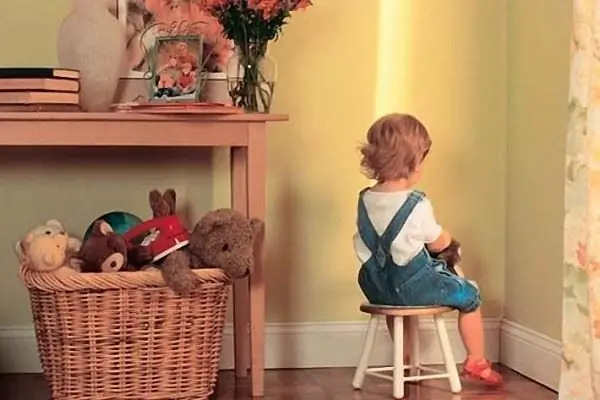- Author Horace Young young@householdfranchise.com.
- Public 2023-12-16 10:35.
- Last modified 2025-01-23 11:41.
Raising children is not an easy task. Here you need to exercise maximum patience and wisdom on a daily basis, follow a certain sequence of actions and explanations, and be able to find the right words. However, there always comes a moment when the baby, for some reason, violates the established rules. And you can't just leave it that way, so that mistakes don't become a habit in the future. What is the right way to punish children for disobedience?

The types of punishment, according to psychologists, should differ depending on the age of the child and the severity of his offense.
- It is most reasonable to start punishing a child for disobedience at the age of three. It just doesn't make sense to do it before. At an early age, all children are very mobile, so accidentally breaking mom's favorite vase or painting dad's working papers is quite common. However, this is not a reason to shout and, moreover, to beat the child. Such measures should not be applied to children at all. It is very important here to show restraint and, descending to the level of the child (this is an important point of equality), calmly explain the wrongness of his act.
- For school-age children, psychologists recommend applying the punishment for disobedience in the form of temporary isolation. This involves the allocation of a special area in the house, where the child is sent to think about their behavior. The punishment should last no more than an hour. At the same time, of course, it is forbidden to contact a naughty child, give him toys and gadgets.
- The situation is more complicated with adolescents. During puberty, children are quite aggressive towards the notations of their parents and the whole world. They strive to be free, to try something new. It makes no sense to respond with aggression to aggression. It is important to understand that a difficult teenager in emotional heat is unlikely to listen to you. Therefore, you need to let him (and yourself at the same time) "cool down." And then try to still talk to him, giving weighty arguments about how and why you should act. If this method does not help, then house arrest should be tried. In the most extreme cases, it is recommended to contact a specialist.
- All childish misconduct should be differentiated into innocent pranks and serious disobedience. So, for example, the consequences of a broken vase are negligible compared to stealing money from their parents. In the first case, you can do with a simple explanatory conversation, in the second, you can apply a reduction in pocket money or the same house arrest.
There are also general recommendations of experts on how to properly punish children for disobedience:
- Don't do it in public. Punishment is solely a matter for the parents and the child. Otherwise, you will simply humiliate your child, which will cause even more stubbornness and resentment against you.
- You cannot compare your child with others. As a result, you may not get good behavior, but self-doubt.
- Cleaning and doing schoolwork are the primary responsibilities of a child. They cannot be punished! Otherwise, an unwillingness to do these things will develop and, as a result, school performance will decrease, and laziness will appear.
- When deciding to punish the kid with a boycott, you should stick to the end. More precisely, until the moment when he pleads guilty and apologizes.
- Do not use the “not” particle when formulating requirements and rules. For example, the phrase "Do not sit at the table with dirty hands" is better replaced by "Before eating, you need to wash your hands." Simply put, do not forbid the child, but explain to him how to do it right.
- When punishing, all family members must adhere to the same line of behavior. In no case should pity on the part of one of the parents be allowed. In this case, you will bring up a psychological chameleon, and the lesson itself will not be learned.
- A clear balance must be struck. You cannot constantly punish a child without showing your love and affection for him. As a result, the child will grow up anxious, intimidated, constantly doubting what is good and what is bad. At the same time, you cannot ignore the baby's pranks. In this case, on the contrary, you can bring up a rebel and a bully.






